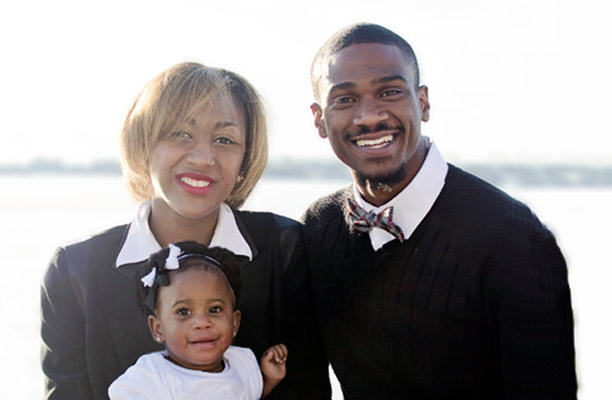
La Tika Smith-Jeffery was adopted when she was 21, after spending her teenage years in foster care. Today she is a recent college graduate, a wife, and the mother of a two-year-old daughter.
What brought you into foster care?
I entered foster care at the age of 13 after being abused by my biological father, who was raising me. While in care, I lived in a total of five homes before aging out. I did not have much contact with my biological mother, who is very ill, during that time.
For many years I dealt with low self-esteem, rage, and trust issues due to the abuse by my father and other family members.
How did you overcome these challenges?
A strong support system, great adoptive parents, and therapy. I wanted better for myself and to be an example to others.
I want people to know that each of us is responsible for our future. It is not defined by our past, by our parents, or by anyone else. At some point, every person has to do what is best for them!
How did you meet the family who adopted you?
After graduating from high school, living in multiple foster homes, and feeling unwanted, I decided to participate in an independent living program. I received a stipend to help with everyday essentials, which was a blessing. But after two years of living on my own, I was in a position of having to choose between work and school.
I reached out to my best friend’s family asking if I could move into their house so that I could save money, continue my education, and regain my focus.
They agreed to my moving in. But they didn’t just open their home to me, they opened their hearts. And because they knew me and my biological father before I entered foster care, they understood my behavior issues. Most importantly, they gave me a chance! That alone meant a lot to me.
How did being adopted change things?
Being adopted showed me what love really is, and how parents should love a child. When you know what love looks like and feels like, you are able to love and respect yourself and know your worth.
Being loved gave me self-confidence that I didn’t realize I was lacking. With my parents’ love, I was able to overcome the challenges of my past and use it to make a difference in other people’s lives today.
Do you still have a relationship with your birth parents?
Yes. My biological mother and I started communicating again when I was 18 years old. It has taken more than seven years, but we are finally starting to be on the same page.
I think it is important for families who are adopting to know that just because a child comes from a dysfunctional background, it does not mean there is a loss of love for all biological family members. At times, the child will struggle to balance relationships with their biological parents and the parents who adopted them.
What other advice do you have for parents who are adopting children or teens?
Be patient and understanding. This will take you a long way. Consider the child’s history. It is an emotional process going from home to home, and everyone reacts differently. Once the child decides to be open and honest with themselves, life will get better.
Set aside what you read about children in foster care or heard from other people and just be that support system they need.
Lastly, as I have learned from my adoptive parents, love them unconditionally. Each child requires an act of love differently. Some want a parent to be physical, for example, to hug them. Some like gifts or surprises. Others may just want to talk. Learn their language of love, and things will flourish from there.